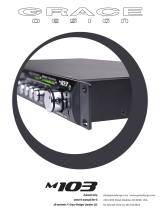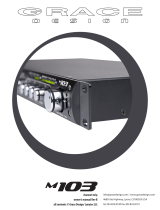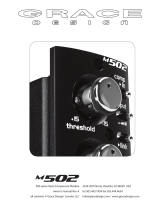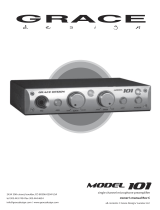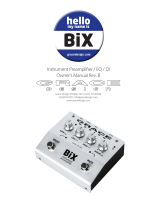Page is loading ...

info@gracedesign.com / www.gracedesign.com
2434 30th Street, Boulder, CO 80301 USA
tel 303.443.7454 fax 303.444.4634
Optical Compressor
Owner’s Manual Rev A
all contents © Grace Design/ Lunatec LLC

2
Welcome and thanks for purchasing the Grace Design m102 optical compressor. We build all of
our products to be completely reliable and easy to use, so you can concentrate on making great
recordings, not struggling with complicated equipment or dicult product manuals. While you will
nd the m102 is completely straightforward to use, we do ask that you spend a little time reading this
manual to help avoid any common user diculties.
In the event that you do encounter any technical diculties with this or any of our products, feel
free to call us at 303-443-7454. Our oce hours are 9:00 to 5:00, Monday through Friday, MST, or you
may e-mail any technical questions to: info@gracedesign.com. Also, please check out our web site for
complete product information, owner’s manuals and technical documents.
Grace Design has been building audiophile quality products for the recording industry for over
18 years. The technology in the m102 is the result of extensive listening, eld-testing and careful
renement. Your m102 represents a combination of absolutely pristine audio performance, robust
mechanical construction and bombproof reliability at a reasonable price.
We sincerely hope our products help you achieve a new level of excellence in your work!
- The Grace Design Team
Contents
Important Safety Information 3
Safety Marking Symbols 3
Features 4
Front Panel Controls / Features 4
Rearpanel Connections 5
Installing and Connecting 6
Operation 6
Technical Specifications 10
Warranty Information 11
Manual Revisions 12

3
Important Safety Information
GENERAL
• Indoor use only
• Ordinary Protection: This equipment should not be exposed to dripping or splashing.
• Avoid placing objects lled with liquids, such as vases or glasses, on this equipment.
• Class I Equipment (grounded type)
• Electrical rating: 100-240V~ 50-60Hz 14W
• Mains supply voltage uctuations are not to exceed ±10% of the nominal supply voltage.
• Pollution Degree 2
• Installation (Overvoltage) Category II for transient overvoltages.
• Maximum Relative Humidity: <80%
• Operation temperature range: 10 °C to 40 °C
• Storage and transportation temperature range –40 °C to 70 °C
• Maximum altitude: 3000m (9843 ft)
• Equipment suitable for continuous operation
• Weight: - 1.1kg (2.4 lbs)
Safety Marking Symbols
CAUTION: READ ACCOMPANYING DOCUMENTS
This symbol, located on the equipment and in this manual, refers to important
instructions. Read this manual thoroughly before operating this equipment.
WARNING: ELECTRICAL SHOCK HAZARD
This symbol, located on the equipment and in this manual, indicates the potential for
electrical shock hazard.
SERVICE INFORMATION
The Grace Design m102 contains no user serviceable components. Contact Grace Design for repair
and upgrade information. In the event that your Grace Design m102 needs to be returned to the
factory, please contact us for a return authorization number.

4
Features
• Elegantly simple, purist feedback design optical compressor for signal leveling with a minimum of
sonic artifacts
• Subtle dynamic control to heavy compression, the sonic character of the source remains intact
• Comprehensive control set includes input level, threshold, attack, release, ratio and makeup gain
• Bright, easy to read 10 segment LED gain reduction meters
• Bi-color output peak LED lights green with signal present and red 6dB before clipping
• Dual balanced inputs and outputs on XLR and 1/4” TRS
• Bombproof laser-etched black anodized frontpanel
• Built in universal power supply
• Five year transferable warranty on parts and labor
• Made in the USA
Front Panel Controls / Features
.03 3
release
sec
3 200
attack
ms
thres hold
15
INPUT OUTPUT
ratio
1
:
1 1 2
:
1
-10 10
10 10
12
3
4
56
7
8
9
10
GR
sidechain
:
1
4
1 5
11500
PEAK
link
out
in
normal
1 2
3 4
5
6
7
8
910
1. INPUT - This knob adjust the input level of the m102, from -10 to +10dB.
2. THRESHOLD - This knob sets the minimum level at which the compressor circuit is activated, with a range of
+15dB to -15dB.
3. ATTACK (milliseconds) - This knob sets how quickly (or slowly) the compressor circuit attenuates the
incoming signal.
4. RELEASE (seconds) - This knob sets how quickly (or slowly) the compressor circuit releases its attenuation of
the incoming signal.
5. RATIO - The ratio control determines the input/output ratio for signals above the threshold level. Higher
ratios result in more aggressive gain reduction while lower ratios will result in more gentle gain reduction.

5
6. SIDECHAIN / LINK / NORMAL - This switch is to activate either a) linking of two m102’s for use in stereo
compression scenarios, or b) to activate external side chain control of the compressor for ducking, de-essing
etc, or c) for normal compressor operation.
7. OUTPUT - The output control provides 20dB of variable level control at the output of the m102, from -10dB
to +10dB. This control is useful for small level adjustments during tracking or for compression gain makeup.
8. POWER / OUT / IN SWITCH - This 3 position switch activates the power supply circuitry and engages the
compressor circuitry.
9. PEAK INDICATOR - The LED peak indicator, which monitors the signal at the output of the compressor,
illuminates green at -10dBu and red at +20dBu (6dB before clipping).
10. GR METER - This 10 segment meter displays the amount of gain reduction being applied to a signal in the
compression circuit.
Rearpanel Connections
PUSH
INPUTOUTPUT
STEREO LINK /
SIDECHAIN INPUT
GRACE DESIGN BOULDER, CO USA
100-240V
~
50-60Hz 7W max
RoHS
COMPLIANT
Pb
12
4
3
1. LINE INPUT - Balanced line inputs, XLR wired pin 2 positive, pin 3 negative and pin 1 ground, TRS wired tip
positive, ring negative, and sleeve ground.
2. LINE OUT - Balanced line outputs, XLR wired pin 2 positive, pin 3 negative and pin 1 ground, TRS wired tip
positive, ring negative, and sleeve ground.
3. STEREO LINK/ SIDECHAIN - This 1/4” input accepts either the connection from another m102 for linking
compressor controls for stereo use, or an external side chain signal source to control the compressor for
ducking or de-essing applications. In sidechain mode, the connection is unbalanced with only the tip
connected, so simply use an unbalanced 1/4” connector. Link mode requires a TRS 1/4” inch cable.
4. POWER SUPPLY - A universal input AC supply provides mains power to the m102. A standard three
prong AC power cable is included with the m102. For safety, the power supply cord must be
connected to a grounded outlet. The Disconnect Device for the m102 is the Mains plug or the
Appliance Coupler on the power supply cord. The Disconnect Device must remain accessible and operable.

6
Installing and Connecting
UNPACKING
Your m102 box includes the m102, an AC power cable, this owner’s manual, a warranty card, a set of
4 adhesive rubber feet, and a #10-32 x 3/8” machine screw. If any of these items are missing, let your
dealer or us know and we will expedite the missing item to you. We strongly encourage you to save
the box supplied with your m102. It is specially designed to properly protect its valuable contents,
and in the unlikely event that you need to return it for service, only these OEM shipping materials will
ensure their safe return to our factory.
Also, we ask you to register your unit with us as soon as possible. We provide a 5 year warranty on
all of our products, but if you don’t register your system it’s hard for us to help you, if and when help
becomes necessary. So please take a few minutes to complete the enclosed warranty registration card
and mail it in, or simply ll out the warranty registration form on our web site. Thank you!
INSTALLING
The m102 can sit on any at surface or be installed in a standard 19” equipment rack tray. The m102
does not run hot and requires no ventilation, so it can be installed with equipment directly above and
below it. If leaving to sit on your desktop or monitor shelf, install the 4 rubber feet to the bottom of the
chassis to prevent scratching your chassis and surface.
RACKMOUNTING THE M102
The m102 chassis has a #10-32 threaded insert mounting hole on the bottom towards the back. Two
m102s can be mounted side by side in a standard 1U rack tray. Use the supplied (or any) #10-32 x 3/8”
machine screw. Do not use a screw longer than 3/8”.
CONNECTING
The m102 is easy to connect. Simply plug a line source into either of the line inputs on the rear (TRS
or XLR). This can be the output of a mic preamp or any other piece of equipment sending signal you
wish to compress. Then connect either of the outputs of the m102 to your recorder, converter, insert
etc... The outputs are parallel and both active, so you can send identical signals to two separate pieces
of gear downstream.
The 1/4” sidechain input accepts either the connection from another m102 for linking compressor
controls for stereo use, or an external side chain signal source to control the compressor for ducking or
de-essing applications. If you are inserting a sidechain signal, use an unbalanced 1/4” cable. Link mode
requires a balanced TRS 1/4” inch cable.
Operation
The compressor circuit is based on an optical attenuator - the purest, high delity gain control
mechanism available. It provides gentle to fairly heavy compression, while remaining neutral and
transparent. This compressor is not designed for “brick wall” limiting.
Similar to an eq, dynamic range compression is a subjective tool – there is no wrong way to use it.

7
However, using a compressor in a way that produces the best results can be complicated, and the
more you know, the better it will work. If you are unsure about how a compressor works, we highly
recommend some reading:
http://en.wikipedia.org/wiki/Dynamic_range_compression
It will pay greatly to understand the mechanism of dynamic range compression BEFORE you begin to
record keeper tracks with the compressor on.
SETTING THE THRESHOLD
The threshold is the level at which the compressor begins to attenuate the incoming signal.
This control can also be loosely thought of as compression amount, as a high threshold setting
(counterclockwise) will result in only the dynamically highest passages of signal to be attenuated,
while everything below that threshold is unaected by the circuit. Conversely, a lower threshold
means more of the signal at the input of the circuit will be attenuated resulting in more compression.
Begin with the knob fully counterclockwise and the compressor switched ON, then slowly begin
turning clockwise until you begin to compress the signal. You will hear the signal compress, and you
will begin to see the GR meter light up. The lower the threshold setting , the more the incoming signal
will be attenuated and the more lights will light up on the GR meter.
SETTING THE ATTACK RATE
The rate at which you want the compressor to start the attenuation of the signal (attack phase)
depends on the character, or envelope, of the signal entering the compressor. If the signal has sharp or
fast attack (percussive sounds, snare drum) that you wish to attenuate, select a fast attack rate to sense
the initial impulse of the signal and attenuate it in time. If you want the compressor to react slower and
not attenuate the initial impulse of the signal, select a longer attack time. Using a slower attack time
may be more appropriate with signals with a slower, more gradual envelope (strings, woodwinds).
SETTING THE RELEASE RATE
The rate at which you want the circuit to release its attenuation of the signal (release phase) is set
with the release control. This is the functional opposite of the attack control. If the signal has a shorter
decay, it may be best to set a shorter release time. A helpful approach to setting the attack and release
time may be to consider the basic pulse of the signal you’re compressing. To avoid the typical artifact
known as ‘pumping’, where you can clearly hear the compressor working, it is important to set the
attack and release times to match the signal to where they are moving naturally with the dynamic
uctuations of the signal.
SETTING THE RATIO
The compressor’s ratio control is used to set input/output ratio of signals above the threshold. For
instance, a setting of 3:1 means that if the incoming signal is 3dB over the threshold level, that signal
will leave the compressor around 1dB over the threshold level. The highest setting of this control is
12:1, meaning that signals far over the threshold setting are reduced by a much higher ratio – more
compression. So lower ratio settings mean lighter compression amounts. We recommend starting
with lower ratios and working upward as necessary.

8
SIDECHAIN CONTROL
Normally, the compressor’s sidechain circuit uses the internal audio signal to trigger its response.
But in sidechain mode, the sidechain circuit uses an external signal input (from the SIDECHAIN / LINK
IN jack on the rearpanel) to determine how the compressor responds. Examples of using an external
sidechain signal include ducking and de-essing.
Ducking is an eect used to automatically reduce the level of one signal when another signal is
present. Think of a DJ’s microphone automatically reducing the level of the music when they are
speaking. It involves routing a separate signal from a microphone (or any other source) into the
sidechain input of the m102. This signal is what the compressor reacts to and thereby would typically
reduce (or duck) the level of the main signal in the m102. You would use the compressor controls to
determine the amount, rate and duration that incoming signal ducks the main signal.
De-essing is used to decrease excessive sibilant (‘s’ or ‘sh’) sounds in a voice. This is accomplished
by inserting a copy of the signal into the sidechain input which has been equalized (by an external
equalizer) to emphasize the frequency where the sibilance lies (usually 6-9k). This inserted signal
makes the compressor react to and thereby reduce only the places in the signal where troublesome
sibilance lies.
There are many other functional and creative ways to use sidechain input, more than can be
illustrated here. Again, the more you know, the more powerful it can be.
LINK CONTROL
This feature is used to link two m102 compressors together for stereo bus compression. To use this
feature, simply run a standard 1/4” TRS cable between two m102’s rear panel link/sidechain jacks. Both
units’ sidechain / link switches must set to link. In this mode, the sidechain signals of both units are
summed together into one. With two units linked, one is the master and the other the slave, with the
master’s controls setting the compression threshold, attach and release of both units. The slaved unit’s
threshold control must be set to the highest, full counterclockwise position.
NOTE: The RATIO controls are not summed, and must be set the same on both units. Due to the
slight, unavoidable variances in the opto coupling devices, completely summing the sidechain signals
may result in a subtle shift in the stereo eld one direction or the other. So the RATIO controls remain
independent to allow you to make nal, subtle corrections to the centering of the stereo image by ear.
GR METER
This meter shows the amount of gain reduction being applied by the compressor. The LED’s
illuminate right to left, with one LED representing 1dB of gain reduction and ten LED’s representing
10dB’s of gain reduction or more. Selecting a lower threshold setting will activate the compressor with
relatively lower signal levels and will be reected on the GR meter as more gain reduction. Selecting a
faster ATTACK time will show on the meter as the LED’s turning on faster, selecting a slower RELEASE
will show on the GR meter as the LED’s staying lit longer. There is no correct setting for this meter – it is
simply displaying how the compressor is working. If all the lights are on, you are probably SQUASHING
IT! If only the rst three are lighting up, you are applying gentle compression. The meter is a good
place to start in getting the proper setting, but it doesn’t necessarily mean that it sounds right. As
always, let your ears be your guide.

9
SETTING THE OUTPUT CONTROL
The OUTPUT control provides 20dB of variable level control at the output of the m102. After setting
your desired input and threshold levels, you can set the over all output of the m102 with this control.
Use the OUTPUT to properly match to the input of your converter, interface or whatever is next in your
signal path. Also, your signal level may have been be reduced by heavy compression settings, so the
OUTPUT control can also be used to provide makeup gain.
PEAK LED
The PEAK LED is used to monitor any peaks within the m102. It turns green at -15dBu and red at
+20dBu. The m102’s internal headroom is +26dBu, so occasional red is ne, just a warning that you are
6dB away from clipping. If the light is mostly red, then you are probably clipping the unit all your gear
downstream.

10
Technical Specifications
GAIN RANGE
Input Trim -10 - +10dB
Output Trim -10 - +10dB
Compression
Threshold Range -15 - +15 dBu
Attack Range 3 – 200 ms
Release Range 0.03 – 3 s
Ratio Range 1:1 – 12:1
Gain Reduction 0 – 20dB
THD+N 1kHz, 22Hz-22kHz BW
@ 0dB Gain +10dBu out <0.002%
INTERMODULATION DISTORTION
@ 0dB Gain +20dBu out
SMPTE/DIN 4:1 7kHz/50Hz <0.007%
OUTPUT NOISE 22Hz-22kHz BW
@0dB Gain <-84dB
CMRR @0dB Gain, 3.5Vcm
100Hz >75dB
1kHz >75dB
10kHz >75dB
FREQUENCY RESPONSE
@0dB Gain -3dB 0.016Hz-150kHz
IMPEDANCE
Line In 24kΩ
Main Out balanced 350Ω
Main Out unbalanced 150Ω
Link In – side chain mode 100kΩ
LEVEL METERS
Output Peak Indicator Green: -15dBu / Red: +20dBu
Gain Reduction Meter 0 -10dB Gain Reduction
MAXIMUM OUTPUT LEVEL
100k Ohm load, 0.1% THD +26dBu
WEIGHT and DIMENSIONS
2.4 lbs H1.7” x W8.5” x D9.0”
1.1 kg H4.3cm x W21.6cm x D22.8cm
POWER CONSUMPTION
100-240VAC 5 Watts Max

11
Warranty Information
1. Grace Design warrants all of our products to be free of defective parts and workmanship for a period of ve
years.
2. This warranty period begins at the original date of purchase and is transferable to any person who may sub-
sequently purchase the product during this time.
3. This warranty excludes the following conditions: normal wear and tear, misuse, customer negligence, ac-
cidental damage, unauthorized repair or modication, cosmetic damage and damage incurred during ship-
ment.
4. During the time of this warranty, Grace Design will repair or replace, at its option, any defective parts or re-
pair defective workmanship without charge, provided the customer has appropriate proof of purchase and
that the product has its original factory serial number.
5. Customers within the US are responsible for all inbound freight charges to Grace Design’s facility, while
Grace Design will pay for return freight charges via ground service. Customers outside the US must contact
their distributor for warranty / product return details.
6. In order for Grace Design to provide ecient and timely warranty service, it is important that you mail the
completed warranty registration card enclosed with all of our products within 10 days of the original date
of purchase. You may also register your product directly with Grace Design by telephone (303-443-7454
Monday-Friday 9:00am to 5:00pm MST), or you can register your product online at www.gracedesign.com.
7. This warranty is in lieu of all other warranties whether written, expressed, or implied, INCLUDING ANY WAR-
RANTIES OF MERCHANTABILITY OR FITNESS FOR A PARTICULAR PURPOSE. In no event will Grace Design be
liable for lost prots or any other incidental, consequential or Exemplary damages, even if Grace Design is
aware of the possibility of such damages.
8. In no event will Grace Design’s liability exceed the purchase price of the product. This warranty gives the
customer specic legal rights. The customer may also have other rights, which vary from state to state. Some
states do not allow limitations on implied warranties or consequential damages, so some of the limitations
of the above may not apply to a particular customer.

12
Manual Revisions
Revision Page Change Date Initials
A all Initial release 11/30/2011 edg
/
